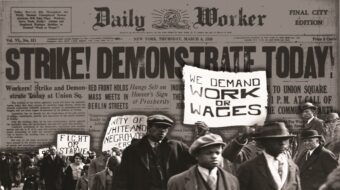
NEW HAVEN, Conn. — In Connecticut, jobless workers were unable to file for unemployment benefits because the phone lines were overwhelmed. That’s not surprising. Demand is up 40%, but state workers are being laid off and vacant positions are not filled. Fortunately, according to a story in the People’s World, State Representative Gary Holder-Winfield led a growing protest, and the governor agreed to increase staff and service.
That’s one victory. But what about people in California, where unemployment now tops 12%? State claims workers were ordered to take two days off each month without pay, aggravating staff shortages.
Or Massachusetts, where clients trying to register for benefits by phone report, “It’s always busy.”
Or Kansas, where a journalist investigating problems with unemployment benefits was told by a state official, “There’s a tremendous number of people who are receiving unemployment, needing information, and our ability to handle all of the incoming calls, we’ve been challenged with that.”
Same with food stamps. One in eight Americans — 38 million of us — now receive food stamps, an increase of 22% in the last year. But in Lima, Ohio, applications were not being processed. “The delays are the result of more people needing the service and fewer people processing paperwork…. [the county] has lost eight caseworkers in the past 18 months, all because of budget cuts.”
In Maryland and Texas, there have been court cases over delays in approving food stamps.
School nurses, social workers, wages and hours inspectors, bus and subway operators — all are being laid off, as the recession-driven demand for their services grows. All these services are provided by state and local governments. And those governments are broke.
Local governments — cities, counties and towns — face a shortfall of $56 to $83 billion over the next two years, according to a report from the national League of Cities. “In response to continuing declining economic conditions and the prospect of budget shortfalls, cities are laying off staff, delaying or canceling infrastructure projects, and making cuts to public safety services,” according to the report. The result could be 600,000 jobs lost this year, and another 900,000 in 2011. There are layoffs in Augusta, Maine, Little Rock, Arkansas, Dallas, Texas, Sacramento, California, and thousands of cities and towns in between. Service reductions are felt in public schools, libraries, police and fire services, and virtually every other city service.
State governments, facing a catastrophic drop in tax revenue, are $350 billion short for 2010-2011, according to the Center for Budget and Policy Priorities, (CBPP), and “…states will continue to struggle to find the revenue needed to support critical public services for a number of years.” State services being cut, according to another CBPP report, include K-12 education, higher education, services for the elderly and disabled, and health care.
The American Recovery and Reinvestment Act (ARRA), better known as the stimulus bill was passed last February. It included $140 billion for states over three years, saving many jobs and services. For example, the ARRA saved at least 250,000 jobs in the public schools. Despite this, 27,000 jobs were lost, resulting in higher class sizes and program cuts. And many ARRA programs are set to expire this year, while state budgets are expected to continue to worsen.
State and local governments together employ 15% of all workers. Despite ARRA, they have lost 117,000 jobs in the last year. Without federal action, even more will be lost this year. This hurts the jobless workers and their families. It hurts most residents through slower or non-existent government services. And cuts in state and local jobs threaten the entire economy — every job lost means less local taxes, less local spending, fewer jobs in local business. With the private sector still contracting, government should be adding jobs, not laying off.
The AFL-CIO is leading a coalition of 60 civil rights, labor, and community organizations in pushing a program to put America back to work. One of the five points is aid to state and local governments. There is no demand more important, and there is no demand that can have a faster impact on jobs, the economy, and on the quality of life for all residents. To be really effective, the package should be large enough — at least $100 billion per year — and substantial funds should go directly to local governments as well as to states, according to need.
The next time you are in a long line waiting your turn for a computer at the public library, or at motor vehicles, or are fuming because the music and arts programs have just been eliminated from your child’s school — call your congressperson. Tell them to save our services, save out cities, save our states, by passing the AFL-CIO five-point program for jobs.

MOST POPULAR TODAY


Zionist organizations leading campaign to stop ceasefire resolutions in D.C. area

High Court essentially bans demonstrations, freedom of assembly in Deep South

Afghanistan’s socialist years: The promising future killed off by U.S. imperialism

Communist Karol Cariola elected president of Chile’s legislature






Comments